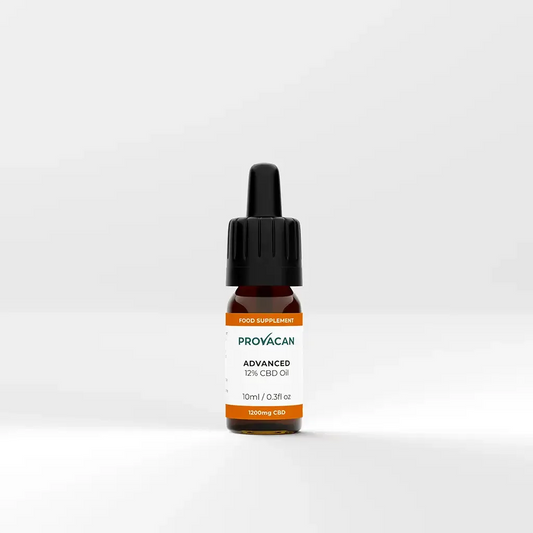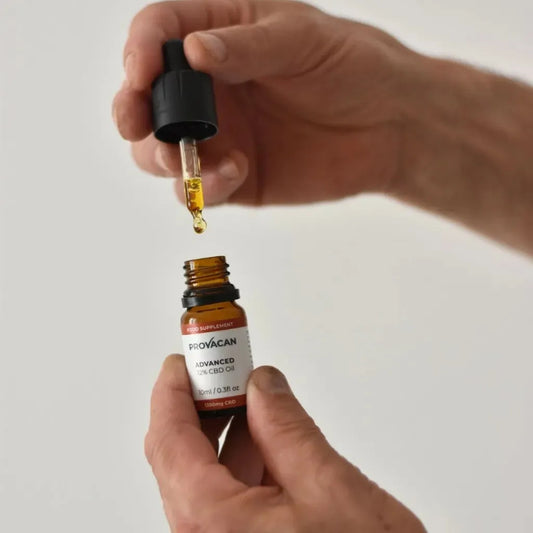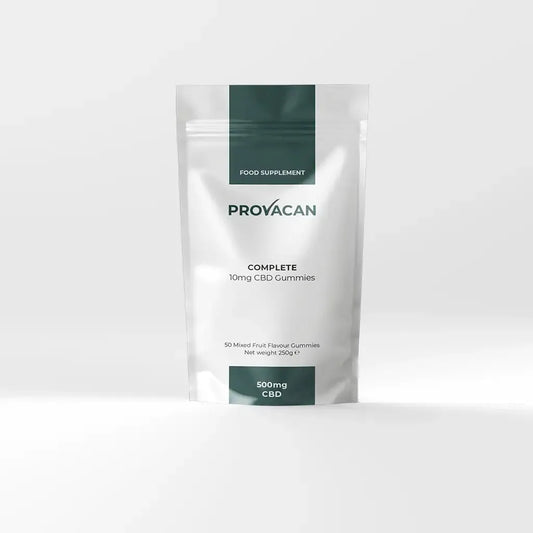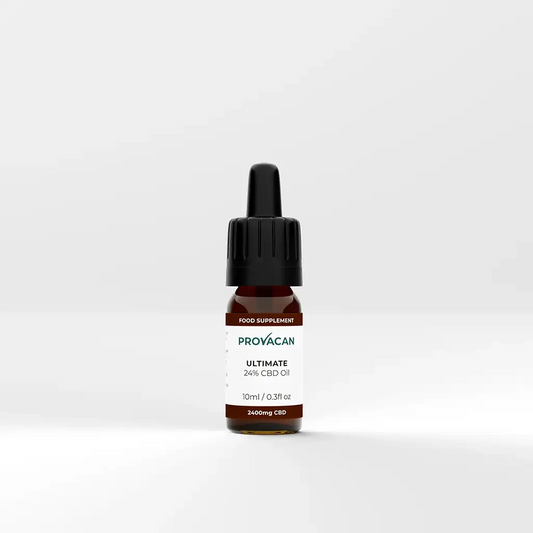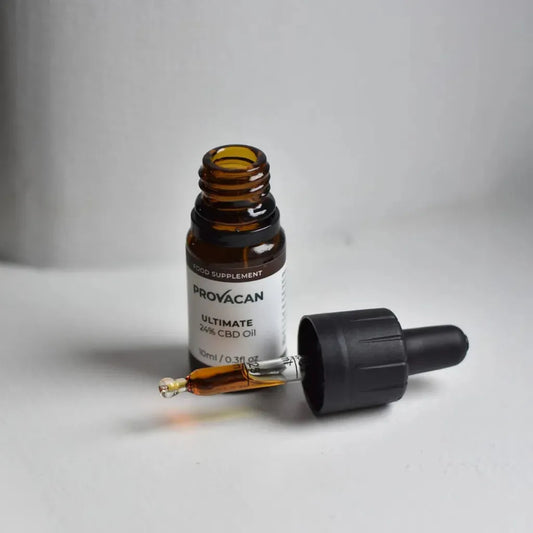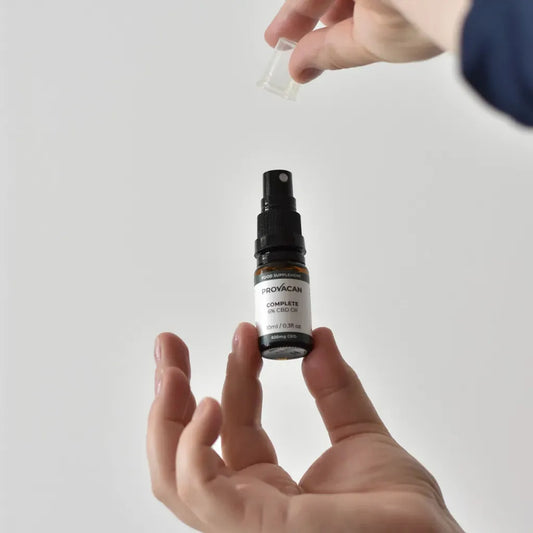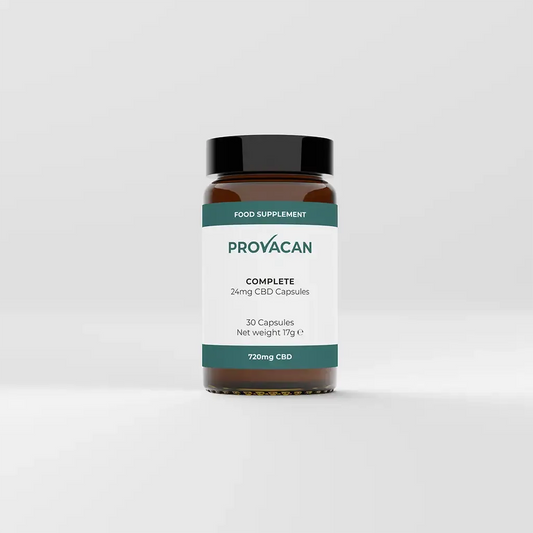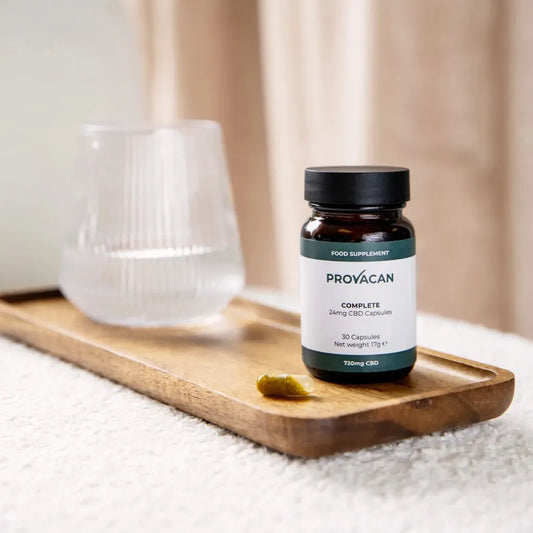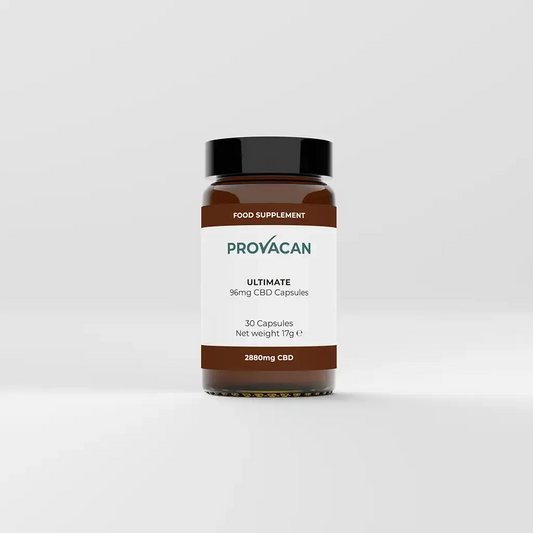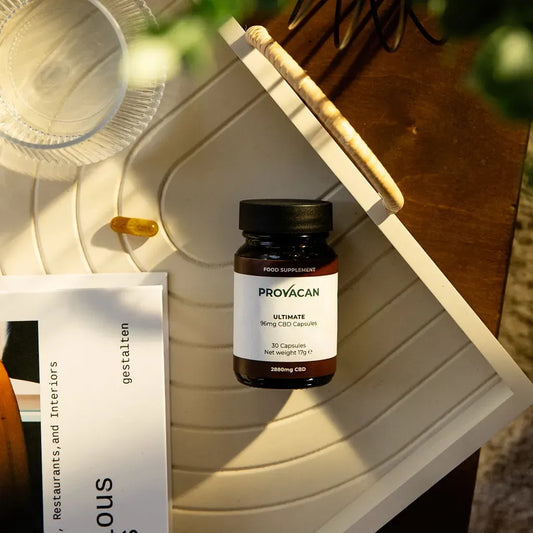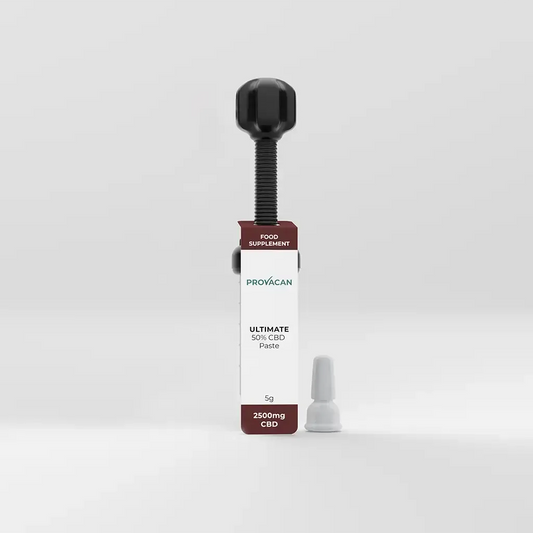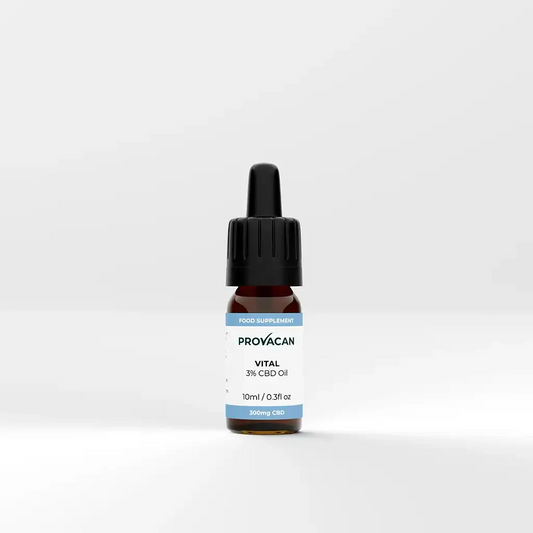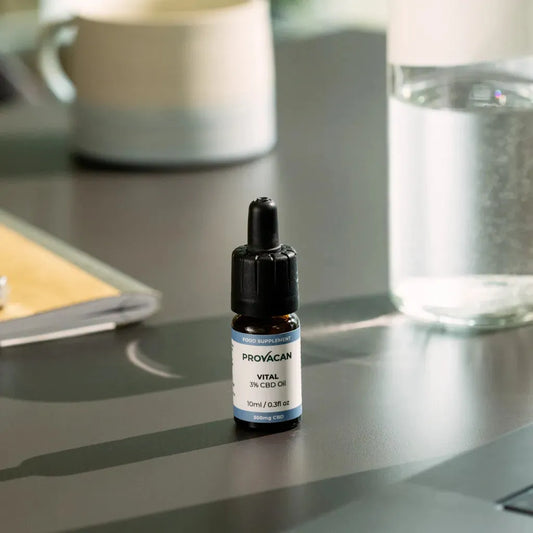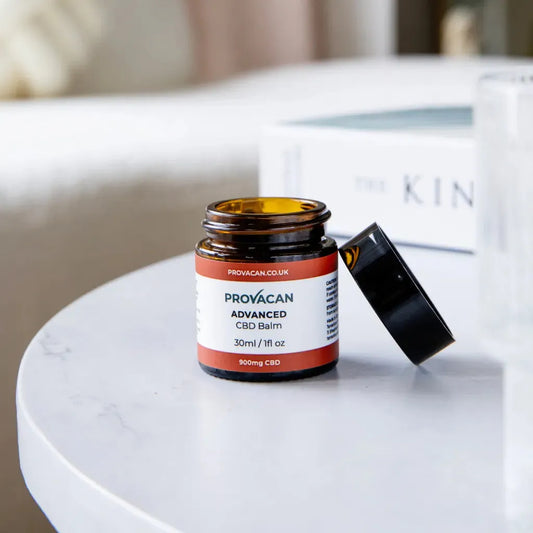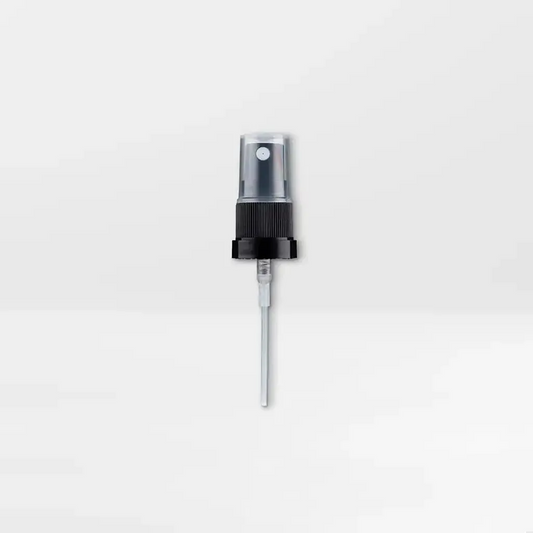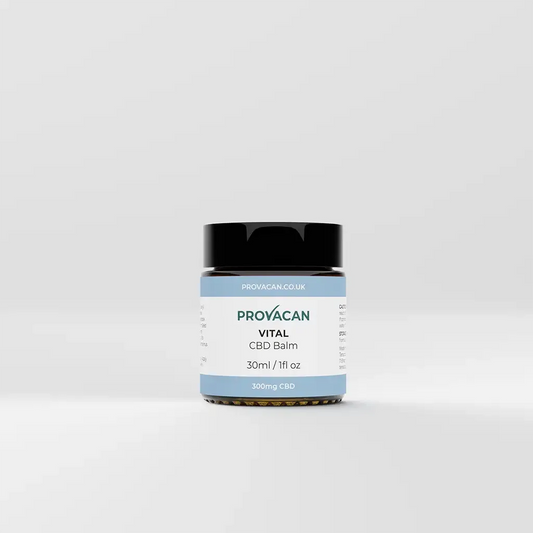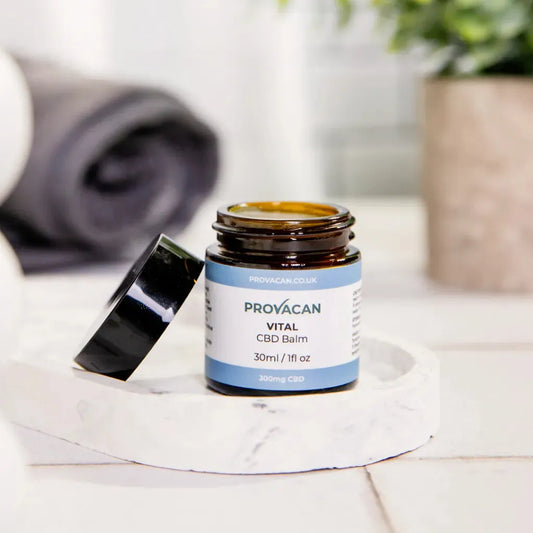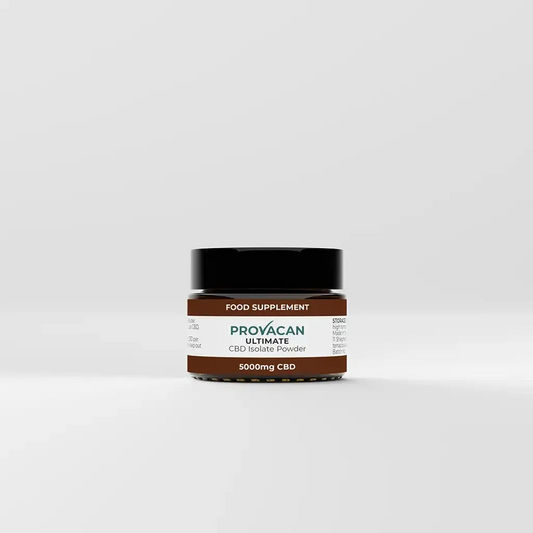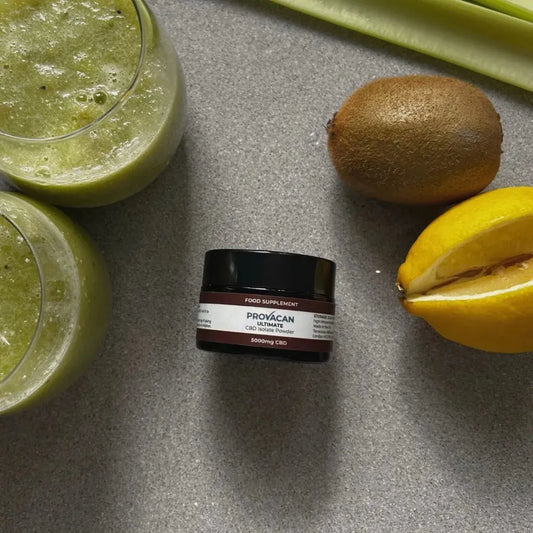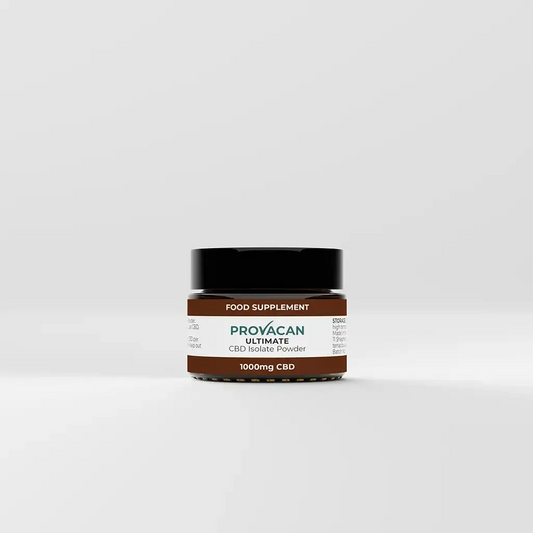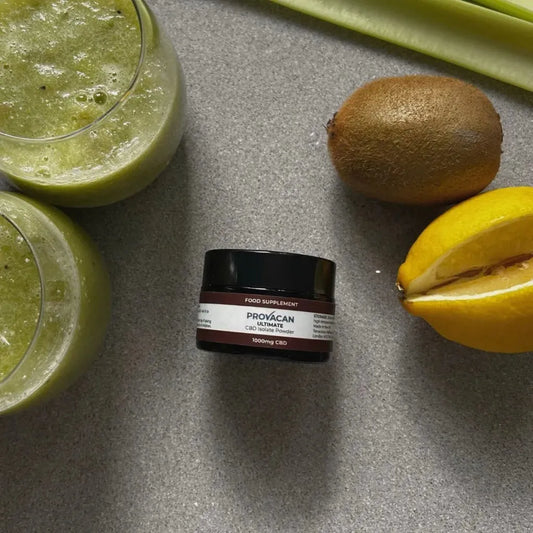Collection: CBD For Insomnia: The Natural Solution For A Restful Night's Sleep
Are you tired of tossing and turning night after night, struggling to get a restful night's sleep? If so, you're not alone. Insomnia affects millions of people around the world, impacting their quality of life and overall well-being. If conventional sleep aids have left you feeling groggy or have fallen short of providing the relief you seek, it may be time to explore a natural alternative: CBD.
-
Book your free consultation
Get expert guidance on natural ways to support sleep, stress, and more.
BOOK NOW
-
Provacan Advanced CBD Oil | 1200mg / 12% CBD, 10ml
4.7 / 5.0
(215) 215 total reviews
Regular price £49.99Regular priceUnit price / per -
Provacan Complete CBD Gummies 50 Pack | 10mg CBD per gummy
4.7 / 5.0
(191) 191 total reviews
Regular price £22.99Regular priceUnit price / per -
Provacan Ultimate CBD Oil | 2400mg / 24% CBD, 10ml
4.7 / 5.0
(167) 167 total reviews
Regular price £79.99Regular priceUnit price / per -
Provacan Complete CBD Oil | 600mg / 6% CBD, 10ml
4.7 / 5.0
(198) 198 total reviews
Regular price £34.99Regular priceUnit price / per -
Provacan Complete CBD Capsules | 24mg CBD per capsule, 30 Pack
4.6 / 5.0
(169) 169 total reviews
Regular price £34.99Regular priceUnit price / per -
Provacan Ultimate CBD Capsules | 96mg CBD per capsule, 30 Pack
4.6 / 5.0
(70) 70 total reviews
Regular price £89.99Regular priceUnit price / per -
Provacan Ultimate CBD Oil Paste | 2500mg / 50% CBD, 5g
4.7 / 5.0
(267) 267 total reviews
Regular price £89.99Regular priceUnit price / per -
Provacan Vital CBD Oil | 300mg / 3% CBD, 10ml
4.6 / 5.0
(124) 124 total reviews
Regular price £24.99Regular priceUnit price / per -
Provacan Advanced CBD Oil | 1200mg / 12% CBD, 10ml - 3 Months Subscription
5.0 / 5.0
(3) 3 total reviews
Regular price £89.98Regular priceUnit price / per£149.97Sale price £89.98Sale -
Provacan Advanced CBD Balm | 900mg / 3% CBD, 30ml
4.6 / 5.0
(70) 70 total reviews
Regular price £39.99Regular priceUnit price / per -
Provacan Ultimate CBD Oil | 2400mg / 24% CBD, 10ml - 3 Months Subscription
4.5 / 5.0
(6) 6 total reviews
Regular price £143.98Regular priceUnit price / per£239.97Sale price £143.98Sale -
Provacan Complete CBD Gummies 50 Pack | 10mg CBD - 3 Months Subscription
5.0 / 5.0
(1) 1 total reviews
Regular price £41.38Regular priceUnit price / per£68.97Sale price £41.38Sold out -
Spray Nozzle for CBD Oil
3.5 / 5.0
(8) 8 total reviews
Regular price £1.99Regular priceUnit price / per -
Provacan Vital CBD Balm 300mg CBD / 1% CBD, 30ml
4.2 / 5.0
(5) 5 total reviews
Regular price £22.99Regular priceUnit price / per -
Provacan Ultimate CBD Isolate | 5000mg / 5g CBD
4.6 / 5.0
(66) 66 total reviews
Regular price £44.99Regular priceUnit price / per -
Provacan Ultimate CBD Isolate | 1000mg / 1g CBD
4.6 / 5.0
(65) 65 total reviews
Regular price £22.99Regular priceUnit price / per
Key Takeaways:
- Insomnia is a Common Condition: Insomnia impacts millions of people around the world.
- Many Treatments for Insomnia are Ineffective or Carry Harsh Side Effects: Many medical treatments for insomnia fail to provide relief, or cause a variety of side effects.
- CBD May Offer a Natural Option: CBD may provide a natural, holistic approach to treating insomnia.
The Science Behind CBD And Sleep
Research on the potential benefits of CBD in managing sleep-related issues has been a focal point for scientists in recent years. CBD interacts with the endocannabinoid system (ECS), a complex network of receptors and neurotransmitters that helps regulate various physiological processes, including sleep.
One of the primary ways CBD may influence sleep is by targeting anxiety and stress, which are common contributors to insomnia. Studies suggest that CBD has anxiolytic properties, meaning it may help reduce feelings of anxiety and promote relaxation, which can improve sleep quality.
Moreover, CBD has shown promise in addressing underlying factors that disrupt sleep patterns. For example, CBD may interact with serotonin receptors, which are involved in regulating mood and sleep. By modulating serotonin levels, CBD could potentially enhance the natural sleep-wake cycle.
Additionally, CBD may influence the body's internal clock, known as the circadian rhythm, which plays a crucial role in determining when we feel awake and when we feel sleepy. By supporting the circadian rhythm, CBD could help promote a more consistent and restful sleep pattern.
Furthermore, research suggests that CBD's anti-inflammatory and neuroprotective properties may also play a role in improving sleep quality. Inflammation and oxidative stress can impact sleep negatively, and by reducing these factors, CBD could support overall sleep health.
While more clinical trials are needed to fully understand the mechanisms by which CBD affects sleep, preliminary research and anecdotal evidence indicate that CBD has the potential to be a valuable tool in addressing insomnia and other sleep-related conditions.
Incorporating high-quality CBD products from a trusted source like Provacan into a comprehensive sleep routine may offer individuals a natural and effective way to optimize their sleep quality and overall well-being.
Potential Benefits Of CBD For Insomnia
Insomnia is a common sleep disorder that affects a significant portion of the population. Those who struggle with insomnia often find it challenging to fall asleep, stay asleep, or experience restful sleep, leading to fatigue, irritability, and a decline in overall well-being. While traditional treatment options like prescription medications may come with unwanted side effects or risks of dependency, many individuals are turning to natural alternatives like CBD for potential relief.
Sleep Regulation: CBD has shown promise in regulating the sleep-wake cycle by interacting with the body's endocannabinoid system, which plays a key role in functions like sleep, mood, and stress. By promoting a state of balance, CBD may help regulate sleep patterns and improve overall sleep quality.
Anxiety and Stress Reduction: Anxiety and stress are common contributors to insomnia. CBD's potential anxiolytic (anti-anxiety) properties may help ease the mind, promote relaxation, and alleviate the symptoms that can interfere with a good night's rest.
Pain Relief: Chronic pain conditions can also contribute to insomnia by making it difficult to find a comfortable sleeping position or stay asleep throughout the night. CBD's anti-inflammatory and analgesic properties may help alleviate pain, potentially improving sleep quality for those dealing with pain-related sleep disturbances.
Relaxation and Calmness: CBD's interaction with serotonin receptors in the brain may promote feelings of relaxation and calmness, which are essential for falling asleep easily and staying asleep throughout the night.
Incorporating CBD into your wellness routine for insomnia should be done under the guidance of a healthcare professional, particularly if you are already taking medications or have underlying health conditions. As with any supplement, individual responses to CBD may vary, so it's essential to start with a low dose and gradually increase as needed to determine what works best for your body.

How To Choose The Right CBD Product For Insomnia
When it comes to using CBD for insomnia, selecting the right product is crucial to ensure optimal results. Here are some key factors to consider when choosing a CBD product specifically for addressing sleep issues:
CBD Potency: Look for products that clearly state the amount of CBD per serving. For insomnia, you may want to opt for higher potency products to ensure effectiveness in promoting better sleep.
Full-Spectrum vs. Isolate: Full-spectrum CBD products contain a wide range of cannabinoids and terpenes, which may have a synergistic effect known as the entourage effect. Consider whether a full-spectrum or isolate CBD product is better suited for your sleep needs.
Third-Party Testing: Always check for third-party laboratory testing results. This ensures that the CBD product is free from contaminants and accurately labeled in terms of potency.
Method of Administration: CBD products come in various forms, including oils, capsules, edibles, and topicals. For insomnia, oils and edibles are commonly preferred due to their longer-lasting effects.
Quality Standards: Choose a CBD product from a reputable company like Provacan, known for its commitment to quality, transparency, and adherence to strict manufacturing standards.
Consult with a Healthcare Professional: If you are new to using CBD for insomnia or have any concerns, it's advisable to consult with a healthcare professional to determine the best dosage and product type for your specific needs.
By considering these factors and selecting a high-quality CBD product that aligns with your preferences and needs, you can enhance your chances of effectively managing insomnia and promoting better sleep quality.
The Debate: CBD vs. Traditional Sleep Medications
When it comes to managing insomnia and sleep-related disorders, the debate between using CBD and traditional sleep medications is a topic of interest for many. Traditional sleep medications often come with a host of side effects and can be habit-forming, leading to concerns about dependency and long-term use.
On the other hand, CBD, derived from the hemp plant, has gained popularity for its potential to improve sleep quality without the negative effects associated with traditional medications. CBD works by interacting with the endocannabinoid system in the body, which plays a role in regulating sleep, among other functions.
Studies have shown that CBD may help promote relaxation and reduce anxiety, two factors that often contribute to insomnia. By calming the mind and body, CBD could help individuals fall asleep faster and experience a more restful night's rest.
One of the key advantages of CBD over traditional sleep medications is its mild side effect profile. While some individuals may experience mild side effects such as dry mouth or drowsiness, these are generally well-tolerated and less severe than those associated with prescription sleep aids.
Additionally, CBD is non-addictive, making it a safer long-term option for those looking to improve their sleep patterns without the risk of dependency. This is in stark contrast to traditional sleep medications, which can lead to withdrawal symptoms and rebound insomnia upon discontinuation.
Ultimately, the debate between CBD and traditional sleep medications comes down to personal preference and individual response. While traditional sleep medications may be effective for some, CBD offers a natural and potentially safer alternative for those seeking better sleep quality and overall well-being.
Final Thoughts
In conclusion, for those struggling with insomnia, CBD may offer a natural and effective solution to help improve sleep quality. Provacan, a trusted leader in CBD innovation in the UK, provides high-quality products backed by scientific research to ensure optimum effectiveness. With a commitment to customer wellness and a focus on delivering products that meet stringent quality benchmarks, Provacan is dedicated to helping individuals achieve better sleep and overall well-being.
By leveraging the latest advancements in CBD research and working closely with leading scientists and research bodies, Provacan ensures that its products are potent, pure, and reliable. Whether you are looking to address occasional sleep disturbances or chronic insomnia, Provacan offers a range of CBD products that cater to your specific needs.
With an unwavering focus on your well-being, Provacan is committed to providing you with the highest quality CBD products that can help you experience the positive effects of CBD for insomnia. Trust in Provacan to be your partner in improving your sleep patterns and enhancing your overall quality of life. Choose Provacan for premium CBD products that prioritise your health and wellness. Your journey to better sleep and a healthier life starts here with Provacan.
Read also:
Sources:
- Sznitman, S. R., Vulfsons, S., Meiri, D., & Weinstein, G. (2020). Medical cannabis and insomnia in older adults with chronic pain: a cross-sectional study. BMJ Supportive & Palliative Care, bmjspcare-2019-001938. https://doi.org/10.1136/bmjspcare-2019-001938
- Suraev, A., Grunstein, R. R., Marshall, N. S., D’Rozario, A. L., Gordon, C. J., Bartlett, D. J., Wong, K., Yee, B. J., Vandrey, R., Irwin, C., Arnold, J. C., McGregor, I. S., & Hoyos, C. M. (2020). Cannabidiol (CBD) and Δ9-tetrahydrocannabinol (THC) for chronic insomnia disorder (“CANSLEEP” trial): protocol for a randomised, placebo-controlled, double-blinded, proof-of-concept trial. BMJ Open, 10(5), e034421. https://doi.org/10.1136/bmjopen-2019-034421
Collapsible content
How does CBD work for insomnia?
CBD works by interacting with the body's endocannabinoid system, which plays a key role in regulating sleep patterns. It can help reduce anxiety and promote relaxation, making it easier to fall and stay asleep. Research suggests that CBD can increase overall sleep amounts and improve insomnia. However, the exact mechanisms are still being studied, and outcomes can vary depending on the individual.
Is CBD safe for treating insomnia?
Yes, CBD is generally considered safe for treating insomnia. Provacan's products adhere to strict quality and purity standards, ensuring that our CBD oil is safe for daily use. While CBD is well-tolerated by many, it's important to consult with a healthcare professional before starting any new supplement, especially if you have underlying health conditions or are taking other medications.
How do I use CBD for insomnia?
To use CBD for insomnia, start with a low dose and gradually increase until you find a dose that helps you sleep without causing side effects. It can be taken in various forms, such as oil drops, capsules, or edibles, typically 30 minutes to an hour before bedtime. Consistent use is often recommended for best results. For personalized advice on dosage, please consult with a healthcare provider familiar with CBD.
What are the side effects of using CBD for sleep?
Most people tolerate CBD well, but some may experience mild side effects, such as drowsiness, dry mouth, or changes in appetite. These side effects are generally mild and temporary. If you experience any adverse effects, consider lowering your dosage or consulting with a healthcare professional. Remember, Provacan's CBD products are crafted to meet the highest safety standards.
Can CBD be used with other sleep medications?
CBD can interact with certain medications, including some sleep aids, by affecting how your body processes these drugs. If you're considering adding CBD to your routine along with other sleep medications, it's crucial to consult with a healthcare professional to ensure it's safe and to avoid any harmful interactions.
How long does it take for CBD to work for insomnia?
The time it takes for CBD to work for insomnia can vary depending on the individual and the form of CBD used. Some people may notice improvements in sleep quality within a few days, while others might need a few weeks to observe significant changes. Consistent use and patience are key, as the effects of CBD can become more apparent over time.

